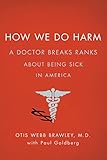Dangerous drug interactions and common drug-induced illnesses are a hidden epidemic in the USA—possibly throughout the world—where unqualified use and abuse of prescription drugs is becoming commonplace and many doctors prescribe multiple meds because they don't have the time to fully diagnose.
In the United States alone known adverse drug interactions cause death, injury or hospitalization to more than 2 million people yearly, and this could be the tip of the iceberg as millions of cases go undetected or unreported.
Robert S. Gold, RPh, MBA, a clinical hospital pharmacist and affiliate instructor of clinical pharmacy at Purdue University with over 27 years of experience, shows the reader how to think like a clinical hospital pharmacist. He lists his 16 Rules of Safe Medication Use that, if followed, can help prevent the common problems that medications can cause; gives specific examples and scenarios featuring the thirty-six drugs that are the most common offenders; and explains how even seemingly good drugs can harm a patient's kidney, liver, brain and heart if the patient's medical history and physical vulnerabilities are not taken into account.
Are Your Meds Making You Sick? A Pharmacist's Guide to Avoiding Dangerous Drug Interactions, Reactions and Side-Effects is highly accessible and formatted for quick reference by any layperson. As the U.S. population ages and there is a steady increase in the number of prescribed and OTC medications and alternative remedies, this book will only become more important.When pharmacist Robert Gold's father began suffering side effects from medication, his expertise in the field was a quick resource. As a pharmacist for over 27 years, however, he realized most people don't have the experience and knowledge to identify adverse drug reactions or common drug-induced illness. Are Your Meds Making You Sick? A Pharmacist's Guide to Avoiding Dangerous Drug Interactions, Reactions and Side-Effects is a highly accessible tool formatted for quick reference that any layperson can use to protect themselves and their loved ones against adverse drug interactions, reactions, and harmful--even lethal--side-effects.
As the U.S. population ages, there is a steady increase in the number of prescribed and OTC medications. Already, each year over 2 million Americans visit their health-care providers due to the adverse side effects of medication, and 700,000 make trips to the emergency room. The number of deaths resulting from adverse drug reactions and interactions has doubled in the last 25 years.
Gold starts with Sixteen Rules for Safe Medication Use--this alone is worth the price of admission--explaining that these simple rules can not only protect us against dangerous medications or drug combinations, but also help us to optimize medications' therapeutic effect. From his vantage as a pharmacist practicing for over 25 years, the author has seen most if not all of the unintended consequences of drug prescription and combining.
Gold uses a forensic or "detective" format to walk the consumer through case histories of dangerous drug interactions in which he explains to the reader what went wrong and what dangerous drug interaction or adverse effect was involved. This device immediately engages readers and, by encouraging them to look with him for a solution to the problem presented, gives them a quick, practical understanding of the subject.
No other book on the market offers the scope and clarity of Are Your Meds Making You Sick? A Pharmacist's Guide to Avoiding Dangerous Drug Interactions, Reactions and Side-Effects. By learning to think like a clinical hospital pharmacist we become aware of the common signs and symptoms of drug-induced illness and how to avoid it. Gold also covers some of the common nondrug medications--herbs, supplements, diet pills--that have potentially dangerous interactions with common prescription and OTC drugs.
Also explained in this life-saving book is how seemingly good drugs can harm a patient's kidney, liver, brain and heart and thus the importance of matching meds to personal physiology, medical history and risk profile. Some of the medication-induced illnesses addressed in Are Your Meds Making You Sick? A Pharmacist's Guide to Avoiding Dangerous Drug Interactions, Reactions and Side-Effects
are:
Pneumonia, respiratory insufficiency, renal failure, bleeding, toxicity, pancreatitis, hypoglycemia, hearing loss, liver failure, seizure, coughing, intestinal blockage, heart problems, diabetic complications, diarrhea, hyperkalemia, movement disorders, opiate withdrawal, rhabdomyolysis, Stevens Johnson Syndrome, falling, hallucinating, and psychosis, among many others.
Are Your Meds Making You Sick? A Pharmacist's Guide to Avoiding Dangerous Drug Interactions, Reactions and Side-Effects is highly accessible and formatted for quick reference by any layperson. As the U.S. population ages and there is a steady increase in the number of prescribed and OTC medications and alternative remedies, this book will only become more important.













